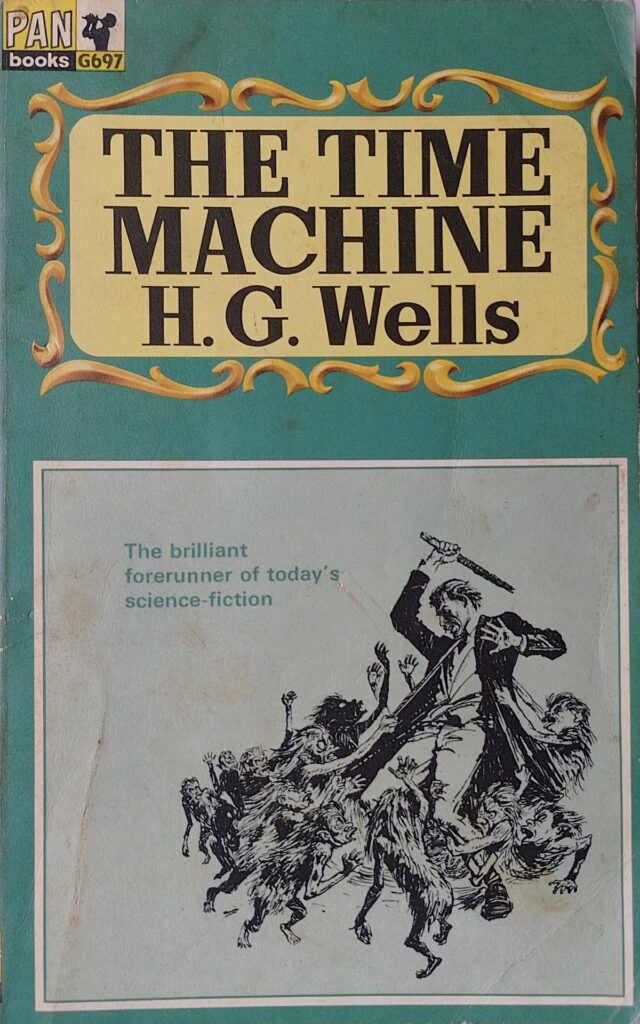First published 1895. Pan paperback, 1966, pp 123, c.43,000 words.
With this book Wells launched himself as a science fiction author of note. The Time Traveller launches himself from late Victorian Britain and describes to sceptical and astonished friends his journey eight-hundred thousand years into the future. He remains in the same geographical location: suburban London, but the city has been utterly transformed and even the river has partially changed course. But what has changed more than anything is the human race. This has now degenerated into two very different types: the surface dwelling lordly but ineffectual Eloi and the sub-surface desperate, vile Morlocks. Clearly Wells is pushing on a fear of his own time and class of the world dividing into the haves and have-nots.
Wells’ explanation of the Time Machine to a degree anticipates Einstein’s description of a four-dimensional space-time. All time exists always, and what we experience is a journey through that dimension, just as we may travel in any of the dimensions of space. The machine enables travel through the time dimension. There are also echoes of a magic performance where the model prototype is demonstrated and disappears. There is some speculation as to why they didn’t see it in the same location if it travelled into the past or why they can’t see it now if it travelled into the future.
There are some might Victorian sentiments expressed such as ‘for the strength of a man and the softness of a woman, the institution of the family, and the differentiation of occupations are mere militant necessities of an age of physical force.’ [p36]. He also makes some prescient thought about the future such as: ‘things will move faster and faster towards the subjugation of Nature.’ [p38] and ‘The difficulty of increasing population had been met, I guessed,’ [p38], although one might consider that is has taken hardly more than a hundred years to achieve those two; rather less than the period in the future to which the Time Traveller has journeyed.
The book is bursting with Wells’ interesting ideas such as: ‘Only those animals partake of intelligence that have to meet a huge variety of needs and dangers.’ [p87]. The Eloi, having achieved a kind of paradise, have lost all vigour and curiosity, becoming little more than children. There is a pessimistic message here, a warning: ‘…saw in the growing pile of civilisation only a foolish heaping that must inevitably fall back upon and destroy its makers in the end.’ [p101].
Ultimately this is a warning vision of the future – become too selfish and the whole house will collapse. Wells has very cleverly wrapped up that message in a very well written tale. In a short book he has created an awful vision of the future. His ‘world-building’ is a master-class of economy for other science-fiction writers.
There is a short, twenty-page, story ‘The Man Who Could Work Miracles’ appended to the main story. It is another cautionary tale, amusingly written.
Wells was a fluent writer, and this still makes for easy reading. It is also thought provoking, resonating today as much as it ever must have done.
Wikipedia biography of Wells: https://en.wikipedia.org/wiki/H._G._Wells
Wikipedia summary of the book: https://en.wikipedia.org/wiki/The_Time_Machine
Others’ reviews of the book: https://www.goodreads.com/book/show/2493.The_Time_Machine?from_search=true&from_srp=true&qid=0aerACbW4m&rank=1
© William John Graham, January 2024

